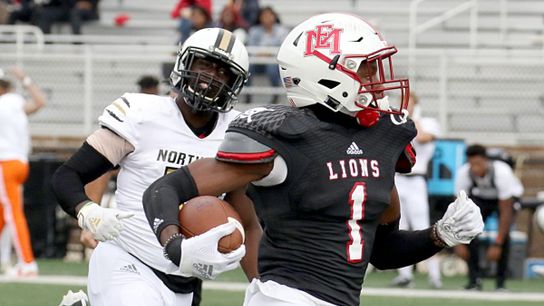On Monday evening, the NJCAA announced that the nation's junior colleges will not compete in football this fall and instead play in the spring. The announcement was a mere formality after the organization told the public this was coming last week.
"Our greatest focus is and always has been providing the best opportunities for our student-athletes," NJCAA president and CEO Dr. Christopher Parker said. "Through a unified effort from our Presidential Advisory Council, the Board of Regents, and leadership staff, our most recent plan of action provides a path that keeps our student-athletes competing at the highest level with proper safety measures in place. As we move forward as an association, we will continue to provide opportunities for our student-athletes, coaches, and all those involved with the NJCAA to be safe and successful."
Except, well, the "National" part in the NJCAA's statement might be under question.
The Mississippi Association of Community Colleges abstained from the NJCAA's vote, instead opting to take a wait-and-see approach adopted by the SEC, ACC and Big 12.
"While we are very concerned about the health and safety of our student-athletes, personnel and fans, we believe [the NJCAA] is best served by waiting for other conferences and organizations to make a final decision regarding fall sports," the statement read.
Part of the reason the MACC tapped the breaks on a spring season is that there's a very real chance its conference would not have enough bodies to conduct a spring season.
The Mississippi Association of Community and Junior Colleges is very much the SEC of the JuCo level, supplying seven of the last nine national champions (including 2019 champ Mississippi Gulf Coast) and a large chunk of the JuCo level's top-end recruits. From the Jackson Clarion-Ledger:
For the Class of 2020, the MACJC produced 56 players rated as 3-stars or better in the 247 Sports Composite rankings who went on to sign with Division I colleges. That number wasn't an aberration either. The MACJC produced 48 such players in 2019 and 42 such players in 2018. In 2018, seven of the 19 players junior college players who rated 4-star or better came from Mississippi junior colleges.
Even aside from the JuCo-to-FBS pipeline, the transient nature of the junior college level increases the possibility that a number of schools could find themselves struggling to fill out a roster after sophomores graduate in December. FBS schools could do to the JuCos what the NFL is threatening to do to the FBS.
As the Columbus Dispatchwrites:
"In my opinion, this decision essentially scratches the season," a MACJC head coach said, who spoke with The Dispatch only on the condition of anonymity. "Any kind of spring football competition at our level will not work. The (NJCAA) should have known that before they made the decision."
Glenn Davis, head football coach at Copiah-Lincoln Community College, said 25 of his players are on track to graduate in December and would not be available in the spring. He opines most, if not all, sophomores part of the two-year JUCO program will elect to skip the season and maintain three years of athletic eligibility for a four-year college. That would leave him with a roster full of freshmen players.
In Davis' opinion, no four-year college coach is going to want a potential recruit to end up playing 20-plus games in a single calendar year with only a two-month recovery period after their spring season.
If the choice in Mississippi is to play in the fall or wait until fall of 2021, then it's no wonder they're not ready to make that call in the middle of July.
